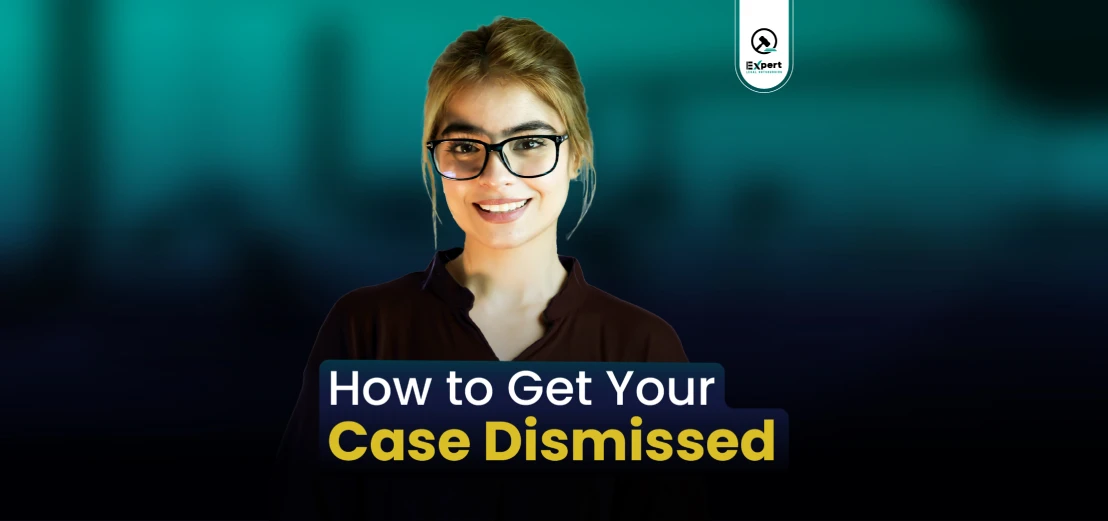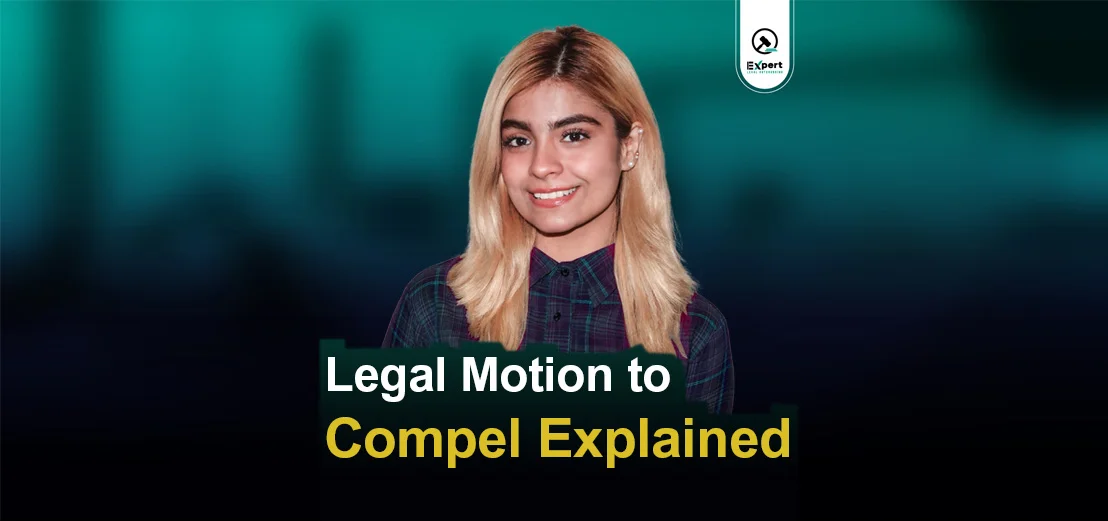Are you facing charges? Have you been called for a Motion Hearing AND You don’t know how to get a case dismissed as soon as possible?
Though it is not an option for all…
A strong defense attorney always pursues a dismissal as the first line of defense.
But how often are motions to dismiss granted or dismissed, No one can truly say.
However, The Administrative Office of the U.S. Courts have estimated that approximately 8% of federal criminal cases get dismissed in the United States.
Morvoer, there is the question of a case being dismissed “with prejudice” or “without prejudice”.
In this blog we will talk about 11 easy ways to fight for a dismissal. Following that, we will further discuss how a criminal case gets dismissed and how having an expert at your side makes the difference.
1. File a Pretrial Motion To Suppress
A motion to suppress is a pre-trial motion where upon the defendant’s request the court chooses to exclude certain evidence from the trial.
This evidence could be physical such as DNA or a gun OR it could be statements. Check out our blog where we have provided an example of Motion to Dismiss. A helpful article with templates that will help you in the long run.
This type of motion is usually based on constitutional law. Basically, the defense argues that the opposing part has violated the defendant’s constitutional rights.
To argue such, the defense needs to prove that the collected evidence or statements were obtained illegally.
So, a violation can happen; for instance, in case the defendant was not informed of their Miranda rights or an illegal search took place.
Thus, if the defendant wins the Motion to Suppress, there is a possibility that the evidence could be crucial to the case.
In such a scenario, the prosecution ends up with not enough evidence to prove the charges.
In the end, the case gets dismissed!
2. Enter a Pretrial Diversion Program
In some cases, defendants get to participate in a pretrial diversion program.
Where if they successfully meet the requirements, the court will dismiss their case. For instance in California there are different types of pretrial diversion programs:
- Drug Diversion
- Mental Health Diversion Programs
- Military and Veteran Diversion Programs
Thus, having a defense attorney is ideal in such a situation. They help you with the legal research and find out if you are eligible for dismissal through diversion.
3. Gather Exculpatory Evidence
The prosecutors have the police on their side to collect evidence.
On the other hand, your defense attorney can also take the investigation into their hands to find exculpatory evidence.
Afterall, if you find evidence that proves that you are not guilty; for instance, an alibi or false statement, the court is more likely to dismiss your case.
4. Challenge the Prosecution’s Case
Though the prosecution might have the police to help them gather evidence, they still have the burden of proof in every case.
They need to prove that you are guilty beyond a reasonable doubt.
Meanwhile, as the defendant, you don’t have a burden. You neither have the burden to prove your innocence nor to put on any evidence.
As a result, If the government doesn’t have enough evidence, the judge or jury cannot find you guilty of the crime.
Your defense lawyer can argue the insufficiency of evidence to support the charges on you. They can argue this at the pretrial motion or during the trial.
Your case will get dismissed right away if your defense lawyer wins this argument.
5. Dispute the Validity of Evidence
Another scenario that could happen…
The prosecution brought out scientific evidence to prove their case. Many judges and jurors are persuaded by scientific evidence such as:
- DNA
- Fingerprint or Hair Sample Analysis
- Gunshot Residue
- Ballistic Testing
- Chemical Testing
- Autopsy Reports
- Blood Splatter
Though scientific evidence holds a lot of power in the courtroom, it is not always reliable. There is always the possibility of the police or examiner not using proper protocol.
To argue against scientific evidence it is best to bring your own expert to give an opinion. Their opinion might turn out strong enough to have the case dismissed.
6. Argue a Violation of the Defendant’s Rights
If, by any chance, the defendant’s rights under…
the Fourth Amendment (unlawful search and seizure),
Fifth Amendment (right against self-incrimination),
OR Sixth Amendment (right to a speedy trial or legal counsel) were violated, your defense attorney could bring that up and the case may get dismissed.
7. Move to Dismiss for Prosecutorial Misconduct
IF the prosecution happens to have acted unethically;
For instance, withholding evidence, coaching witnesses, or making inflammatory statements
This can be used to get the case dismissed. In such a scenario, think about outsourcing litigation support to help smoothen the process.
8. File a Motion to Dismiss for Lack of Jurisdiction
Another way to get your case dismissed is if the court lacks jurisdiction.
There are two types of jurisdictions:
- Subject Matter Jurisdiction (whether the court can hear this kind of case)
- Personal Jurisdiction (whether the court can make a decision that applies to you or your business)
Basically, if the court doesn’t have the proper jurisdiction, it must dismiss the case.
9. Request Dismissal Due to a Defective Charging Document
If the charges are not clearly explained, inconsistent, or legally insufficient, your defense attorney can file a motion to dismiss.
10. Seek Dismissal Based on Double Jeopardy
Another dismissal scenario would be…
If the defendant is being tried AGAIN for the same charges
AFTER an acquittal or conviction,
The case may be dismissed under the Double Jeopardy Clause (part of the Fifth Amendment, protects individuals from being prosecuted or punished twice for the same offense)
11. Comply with a Plea Agreement
One last try!
In some lucky cases, the prosecution might agree to dismiss the charges PARTIALLY as part of a plea bargain, especially if the defendant pleads to a lesser offense.
Its best to follow your defense attorney’s advice. And if you are unlikely to be able to afford a defense attorney, get yourself a virtual attorney to give you pointers.
How a Case Gets Dismissed, With or Without Prejudice?
Okay we are not done yet. Apparently, Case dismissal doesn’t always mean the same thing.
The TYPE of dismissal matters! Especially if the question of refiling the case in the future lingers. There are TWO types of dismissals.
A case dismissed with Prejudice is permanently closed. Basically, it cannot be brought back to court. This usually happens when the judge believes that the case has fatal flaws AND that there’s no point in giving it another shot.
This usually stands as an issue in the scenario where a party is given the chance to correct the issues, and fails to do so. Afterall, once a case is dismissed with prejudice, it’s done for good. UNLESS appealed to a Higher court.
Then there is “A case dismissed without Prejudice” means there is still a chance. In this type of dismissal, the person who filed the case (whether it’s the prosecution or the plaintiff) can refile it. Before they refile, they usually either correct a legal issue or gather more evidence.
HOWEVER, A statute of limitations might apply in such a case.
On top of that, there are two more types of dismissals, they can be either voluntary or involuntary.
| Type of Dismissal | Who Initiates It? | Common Reasons | Can It Be With or Without Prejudice? | Example Scenario |
| Voluntary Dismissal | The party who filed the case (e.g., plaintiff or prosecution) | Lack of evidence, strategic refiling, settlement, or procedural issues | Yes | Prosecution drops charges after key evidence is excluded. |
| Involuntary Dismissal | The judge (often after a motion from the opposing party) | Legal errors, failure to state a claim, missed deadlines, or insufficient evidence | Yes | Defense files a motion to dismiss due to lack of probable cause, and the judge agrees. |
With every type of dismissal, there are different consequences. Whether it’s voluntary or involuntary, and with or without prejudice.
Understanding the difference helps you know your options.
Frequently Asked Questions About Case Dismissals
Q1: When is a Case Dismissal Appropriate?
- Lack of Probable Cause for Arrest
- Illegal Stop or Search
- Error in the Complaint or Charging Documents
- Failure to Read Miranda Rights
- Insufficient Evidence
- Lack of Witnesses
Q2: What If a Case is Dismissed due to the Statute of Limitation?
It would mean the legal time limit to bring in charges has passed. The case can no longer be refiled.
How an Experienced Attorney Can Help You Get a Case Dismissed
- Spotting Legal Mistakes
A defense lawyer can help you analyze extensive legal procedures that police, investigators, prosecutors, and courts must follow. Only an expert can spot any technical errors made along the way.
On top of that, Violation of procedures like reading Miranda Rights improperly can get charges dismissed when brought to attention.
A highly skilled, experienced attorney will be able to recognize such issues and bring light to it in court if found necessary.
- Intimidating The Prosecution
Doubt gives root to hesitation. Similarly, many weak cases get dropped because the prosecution gives into doubts in their ability to win.
Get an aggressive attorney who can falter the prosecution’s confidence through motions to exclude evidence, extensive requests for information, deposing witnesses, and more.
So, if the prosecution feels even a little bit that their case is no longer strong enough, they may withdraw the charges rather than risk losing at trial.
- Using Legal Justifications (Affirmative Defenses)
Defenses such as self-defense, insanity, or acting under pressure (duress) are known as affirmative defenses. Hire an expert attorney who can help you present proof that shows that the defendant had a legal reason for their actions.
If this approach succeeds, then it can get the case dismissed.
- Negotiating for Lesser Charges (Plea Deals)
You won’t always get lucky. Sometimes, you might fail to get the charges fully dropped. But defense lawyers have a scope to negotiate with the prosecution for a better deal.
For instance, they could end up reducing some serious charges or arrange a deal that avoids jail time, especially for first-time offenders.
- Getting Charges Reduced
Even without the case getting dismissed. An expert defense attorney can often lower the charges. For example, they may get a felony reduced to a misdemeanor by shower problems with the evidence.
This could result in less severe penalties and shorter jail time.
- Securing Pretrial Intervention
There is a loophole for First-time offenders, they may qualify for special programs instead of spending jail time. Special programs such as community service, rehab, or counseling.
If they complete the program successfully, the case can be dismissed, and no conviction goes to their record.
Conclusion
In conclusion, despite the charges you are being committed for, performing proper legal research is vital for you to figure out a strategy to get your case dismissed. In this blog, we listed down How to get a case dismissed.
Following that, we discussed the different types of case dismissals out there such as “With or Without Prejudice”, and “Voluntary and Involuntary Dismissal”.
Then we asked two of the most popular questions asked by people around the world. Lastly, we listed down how having an experienced attorney helps with getting your charges dismissed.
So, without further delay, outsource legal services, find the right expert and get your case dismissed today!

Rafia Alam Rowshni delivers a unique combination of legal knowledge and content creation talent using SEO Tools and SERP analysis. She has a solid background in public health and legal services and knows the complexities of the legal world. She can translate complex subjects into simple, concise, and entertaining information that audiences can actually use.




